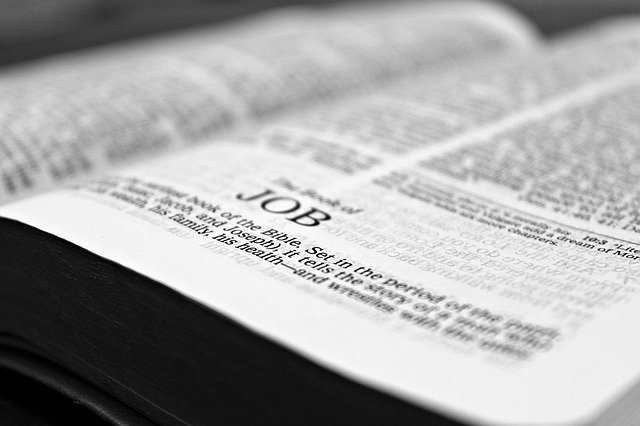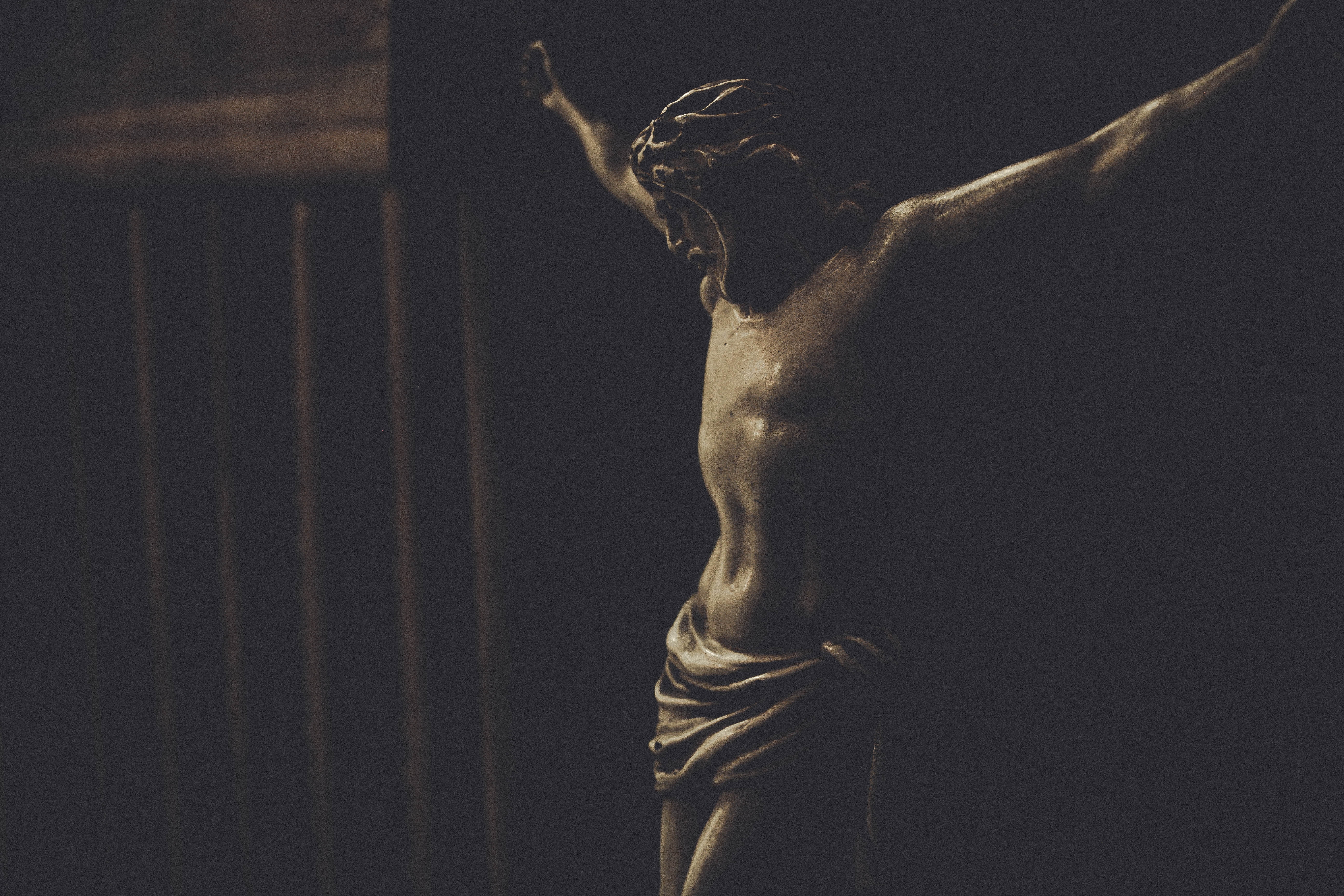 17 What is man, that you make so much of him,
17 What is man, that you make so much of him,
and that you set your heart on him,
18 visit him every morning
and test him every moment? – Job 7:17-18
Is the charge of Job fair? Is it accurate? Does God really test man every moment? Does God even test us? If so, who do we mean by us? Does God test some people or all people?
If God tests man who would know better than Job? Well, obviously God would. So let’s see what He has to say.
4 Then the Lord said to Moses, “Behold, I am about to rain bread from heaven for you, and the people shall go out and gather a day’s portion every day, that I may test them, whether they will walk in my law or not. – Exodus 16:4
2 And you shall remember the whole way that the Lord your God has led you these forty years in the wilderness, that he might humble you, testing you to know what was in your heart, whether you would keep his commandments or not. – Deuteronomy 8:2
3 you shall not listen to the words of that prophet or that dreamer of dreams. For the Lord your God is testing you, to know whether you love the Lord your God with all your heart and with all your soul. – Deuteronomy 13:3
I recognize that these are just a sampling of Bible verses related to the idea of God testing man, but I think they are sufficient to answer the question in the affirmative. God does test man. But that is just the first question.
 Who Does God Test?
Who Does God Test?
I believe to find the first incidence of God testing man we have to go back to the Garden of Eden. After creating the heavens and the earth and populating them with life, God came to His pinnacle of creation; man. Unlike the rest of creation, Adam was made in the image of God. Unlike the rest of creation, Adam was given a free will. Unlike the rest of creation, Adam was given a test. While Adam was blessed with the same command as the other living creatures, to be fruitful and multiply, only Adam was given a prohibition.
The Garden of Eden was full of trees for Adam to enjoy, but there was one tree that was off limits. With this tree God tested Adam. “And the Lord God commanded the man, saying, “You may surely eat of every tree of the garden, 17 but of the tree of the knowledge of good and evil you shall not eat, for in the day that you eat of it you shall surely die” (Genesis 2:16-17).
We are told in the preceding verse (15) that God placed Adam in the Garden to work it (avadh) and keep it (shamar). Since the ground was not yet cursed we often wonder what this work entailed. There would be no weeds to pull and the watering was apparently taken care of from the mist that came from the ground as rain was reserved for the future. It is often assumed that God gave Adam this “job” as a means of healthy discipline. While I can’t be dogmatic, I wonder if it wasn’t part of Adam’s test. In other words, were the commands given to Adam only physical in nature or is it possible there is a spiritual inference?
In the Old Testament the word avadh often means to serve God and similarly, shamar is often used in reference to keeping the commandments. In a sense, we can think of Adam as a priest and the garden as a temple. Doing so may help us to avoid the trap of separating the physical from the spiritual, secular from religious, or work from worship. Note that it is just after God places Adam in the garden to “work it” and “keep it” that He instructs him regarding the trees; those he can eat from and the one he can not. Perhaps Job’s charge was accurate. Adam was being tested every moment.
Adam was no automaton. A test that cannot be failed is no test. A man who is forced to obey or forced to love is no man. God knew the risk. Adam ate the forbidden fruit. Death entered into the world because Adam failed the first test. Because of Adam’s failure, his offspring would be born with a sin nature. But it was only the first test for man.
 22 After these things God tested Abraham and said to him, “Abraham!” And he said, “Here I am.” 2 He said, “Take your son, your only son Isaac, whom you love, and go to the land of Moriah, and offer him there as a burnt offering on one of the mountains of which I shall tell you.” – Genesis 22:1-2
22 After these things God tested Abraham and said to him, “Abraham!” And he said, “Here I am.” 2 He said, “Take your son, your only son Isaac, whom you love, and go to the land of Moriah, and offer him there as a burnt offering on one of the mountains of which I shall tell you.” – Genesis 22:1-2
Just as we are all familiar with the fall of Adam, so we are familiar with the faith of Abraham. God had called Abram to leave his land and family. God had a different land to show Abram and a great nation to make from him. In Abram, all the families of the earth were to be blessed. In faith Abram obeyed, but how strong was this faith?
Abram was advancing in age and had no offspring of his own. How would he be the father of a great nation? God would answer Abram in a vision. Abram was led outdoors on a clear night and looking towards heaven was challenged to count the stars if he could. Abram was told that his offspring would be as numerous as the stars. Abram believed God and his faith was counted as righteousness. But his faith, although growing, would be given an unthinkable test. Place Isaac on the altar.
Did God really expect Abraham to kill his only son? How does sacrificing Isaac fit into the plans of making Abraham the father of a great nation? Abraham asked no such questions. When Isaac asked Abraham about the sacrificial lamb, Abraham simply answered that God would provide one for a burnt offering. And so God did, but not until Abraham had placed Isaac on the altar and had raised his knife. Unlike Adam, Abraham passed the test of obedience. God stayed the hand of Abraham and spared Isaac. God provided a ram for the altar, but Abraham had already sacrificed what God wanted. His heart.
As sharers of his faith, we are the spiritual “children” of Abraham (Romans 4:16-17). As such, we become heirs of the promises God made to his children (Gal. 3:6-9). But without the ultimate test and the final sacrificial lamb, these promises would be moot.
 8 And being found in human form, he humbled himself by becoming obedient to the point of death, even death on a cross. – Philippians 2:8
8 And being found in human form, he humbled himself by becoming obedient to the point of death, even death on a cross. – Philippians 2:8
As a result of Adam’s sin of disobedience, death entered into the world. As a result of Abraham’s obedience, God taught us that justification comes through faith. But sin and death had to be dealt with. Another test was necessary. A test that would pass through another garden and end on a tree of disgrace. A test that only the last Adam (1 Cor. 15:45) could pass.
At the beginning of His ministry, Jesus was tempted by Satan in the wilderness. Although fasting from food, Jesus was filled with the Spirit. Three times the enemy appealed to Jesus’ “flesh”, three times Jesus countered with God’s Word. Unable to move Jesus, Satan left Him to wait for an “opportune time”.
At the end of His earthly life, Jesus was tested by His Father in the Garden of Gethsemane. Instead of a fast, this test was preceded by the last supper where Jesus passed the bread and wine that would represent his broken body and shed blood. Blood that He would sweat in the Garden. Three times the Son pleaded with the Father, three times Jesus submitted to the Father’s will. Because we are unable to save ourselves, Jesus left the Garden to drink from the cup. The cross was waiting.
Who does God test? God tested Adam, the first man, Abraham our spiritual father, and Jesus His own son. Moses and the Israelites were tested. Jeremiah and Job were tested. In the Old Testament we have numerous examples of God testing the Israelites and in the New Testament, we see Him testing the faith of believers. For unbelievers, Jesus is the Test.
How does God test us?
To test is to “prove by trial.” The trials that God uses to test us are unlimited. They may range from seemingly trivial irritations to severe afflictions. For Adam, it was a forbidden fruit. For Abraham, it was his only son. For Jesus, it was a bitter cup. For Moses, it was the Red Sea. For Joshua, it was the walls of Jericho. The children of Israel were tested with manna, wandering and false prophets as we saw in the scripture passages above. Perhaps their most difficult tests were exile and captivity, tests Isaiah referred to as a “furnace of affliction” (Isaiah 48:10). But studying the various trials God might use doesn’t answer the question. Quite simply, God tests us with His Word. When trials come, will we trust Him?
God gives us commands. God gives us instructions. God reveals His character to us showing He is trustworthy. Then He gives us tests to see if we will indeed trust Him. Tests to see if we are willing to obey Him. Romans 6:17 refers to it as, “becoming obedient from the heart to the standard of teaching to which you were committed.”
It is important to realize that God not only tests us with His Word but enables us with it as well. The better we know God’s Word the better equipped we are to handle the tests that come our way. The better we know God’s Word the more we should understand our weakness and His character. These truths enable us to Trust God and not lean on our own understanding. A wise thing to do at all times.
Why does God test us?
According to Exodus 16:4, God tested the Israelites to see whether they would walk in His law. According to Deuteronomy 13:3, He tested them to know whether they loved the Lord their God with all of their heart and soul. According to Judges 3:1,4, He tested Israel to know whether they would obey His Word, the same reason Paul tested the Corinthians (2 Cor. 2:9). In 2 Chronicles 32:31 God withdrew from Hezekiah to test his heart. When David prayed for the building of the Temple, he confessed that God tests the heart (1 Chronicles 29:17). According to Jeremiah 17:10, God searches the heart and tests the mind.
Whether God is testing our hearts or our minds or our love for Him, one thing is constant; God tests us to grow us. When He tests us He measures our faith; how is it developing? Such is what Jesus did with Philip in John chapter six when He asked Philip where they could buy bread to feed the multitudes. He measures our growth and learning. He tests our faith not for His benefit (He already knows it or the lack thereof) but for ours. We need to know how our faith “measures” up. Although we believe, we need help with our unbelief. Like a muscle, our faith needs to be worked. Like silver in the furnace, we need to be refined. The more we grow the more we can live by faith and not by sight (2 Corinthians 5:7). The more we grow the more fit we become for the Kingdom.
God tests us for His glory. Often, the more we are tested the more clearly we see Jesus. The “furnace of affliction” has a way or burning away the dross of the world. Suffering has a way of removing the visage of sentimentalism. The more clearly we see Him the more we reflect Him. The more we become like our Savior the more the name of God is exalted. It is no coincidence that the most powerful witnesses are often those that have endured the most testing. The more we respond to tests in trust and obedience the more powerful our testimonies become for today and the greater our passion for tomorrow.
God tests us because He loves us. He tests us for present victories. God’s tests prepare us for a better future. Understanding the benefits of tests motivated David to pray, “Prove me, O Lord, and try me; test my heart and my mind. For your steadfast love is before my eyes, and I walk in your faithfulness” (Psalm 26:2-3). David wasn’t alone. James, the brother of Christ encourages us with these words, “Count it all joy, my brothers, when you meet trials of various kinds,3 for you know that the testing of your faith produces steadfastness” (James 1:2-3).
Final Thoughts
With the exception of Christ, every man since Adam has been born with rebellion in his heart. We are surrounded by people who not only encourage but exalt rebellion. We are encouraged to rebel against authority figures. We are encouraged to rebel against absolutes (blindly allowing new ones to be established). Foolishly, we are allowing the enemy to undermine our faith in our Creator. Ultimately, Satan wants us to shake our fists at God. God uses tests as a reality check.
Being tested can make us uncomfortable. Being tested introduces more tension to our lives. Tests from God represent a crisis; a time for us to make a choice. Are we going to rebel against our Creator who works all things together for our good (Romans 8:28), or are we going to trust Him?
In the midst of his suffering, Job questioned God about his testing. In frustration, Job takes truths that are meant to be a comfort to man and turns them into a complaint. In Psalm 8:4-5, the Psalmist asks,
“what is man that you are mindful of him,
and the son of man that you care for him?
Yet you have made him a little lower than the heavenly beings
and crowned him with glory and honor.”
In the vastness of the universe, what is man? Why does God exalt him? Why does God give him dominion? Why does God even pay attention to man? Created in His image man has intrinsic value. Numerous Psalms tell us that God sustains man by examining and testing him. The Psalmists intended to comfort their fellow man with the truth of God’s unending vigilance, never leaving us alone. Truths that manifest the love of God and should inspire our worship of Him.
Job, during his season of testing, turns these truths on their head. He feels that God’s constant presence is a source of oppression. Instead of praise, his lips utter a complaint. Job is merely a man, if God’s presence is equated with suffering, how can he bear it? He doesn’t want to be visited every morning and tested every day. When we are in Job’s frame of mind, we need to look to Jesus.
Jesus enjoyed eternal fellowship with the Father. John chapter one tells us that in the beginning, the Word was with God. Literally, this means that Jesus was face to face with God enjoying His intimacy. For Jesus, the greatest test wasn’t the constant presence of God that intimidated Job, but the fear of the opposite. For Jesus, the bitter cup from which He had to drink wasn’t just the pain associated with the Passion, but the fear of a “break” in His fellowship with the Father. As Jesus hung on the cross and took on our sins, the Father had to look away. In His purity, His eyes could not behold our sins (Habakkuk 1:13). In His justice, He could not ignore them. In His love, He sent His Son to die for them.
The ultimate test for all of us, is what are we going to do with this Truth?